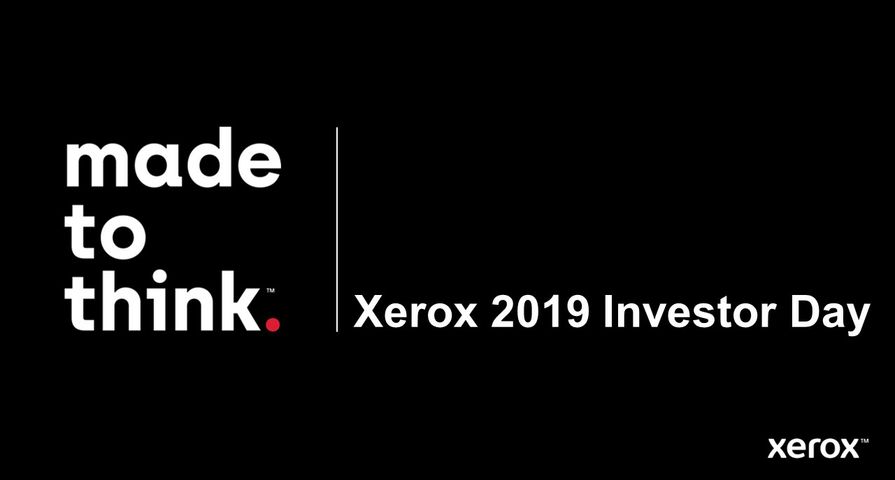Xerox has ambitious plans to reinvigorate its business. Its new “made to think” campaign banks on the power its 100-year heritage in a bid to reclaim its legacy status as a pioneer of technology innovation in the workplace. At its Investor Day on the 5th February in New York, the company discussed its commitment to simplify its operations, instil a culture of continuous improvement, invest in areas of growth and capitalise on new and adjacent market opportunities. Xerox anticipates that it can achieve flat to growing revenue by 2021 and deliver over $3billion of cumulative free cash flow over the next three years. As well as presenting its 3-year strategy, Xerox staged an impressive Innovation Showcase. This covered products areas such as AI, IoT sensors, Digital Packaging and 3D printing through its work with PARC, its R&D group.
So, can Xerox reinvent itself and make the transformation needed to reclaim its place as an industry icon, or will inertia continue to hinder its efforts?
Transformation through Project Own It
In May 2018, Xerox brought in John Visentin to help revive the company and steer a new course much needed for one of the “oil tankers” of the IT industry. Going to an outsider for leadership and revamping the executive team, to bring in a wealth of expertise from IBM, Lenovo and HPE, provides fresh ideas and perspective that Xerox desperately needed.
To drive the company’s enterprise-wide transformation programme, Xerox announced Project Own It. This aims to simplify its business, improve operational efficiency and establish a culture of continuous improvement. Key areas where Xerox is working to simplify its business are procurement, aiming to reduce to 3,000 suppliers from 8,000 today; lowering IT costs to 1% of revenue from 4% today; supply chain improvement; real estate; shared services and delivery. Project Own It is expected to drive gross savings of at least $640 million in 2019, and total savings of at least $1.5B over the three-year horizon.
A revenue roadmap focused on five major strategies
Xerox presented a comprehensive strategy to improve the company’s revenues. Its three-year roadmap builds on its established leadership in core technology markets such A3 copiers, high end production colour and managed print services (MPS).
- Capturing growth through ConnectKey. Xerox has ambitious plans to reinvent the multifunction device (MFD) market by creating a new category of “workplace assistant” that uses new cloud, security, automation, AI and personalisation While Xerox faces strong competition in this space, it is leading the march with respect to personalised and secure document workflow apps through its ConnectKey platform. Xerox is also shifting its MPS proposition to ‘Xerox Intelligent Workplace Services’. With MPS becoming increasingly commoditised Xerox recognises that, to maintain its leadership position, provide more than core MPS services to add value with security, scalable cloud delivery and deeper analytics.
- Accelerating services and software revenue. Xerox has set up a new services and software group to enable organisations to accelerate their paper-to-digital workflow transformation. Vertical service bundles supported by horizontal capabilities cover areas which Xerox has named Digital Patient, Digital Insurer, Digital Retailer and Digital Citizen. Xerox is using its established software products in content management and personalisation which include ConnectKey, FreeFlow, Docushare and XMPie. Xerox appears to be finally making a stronger commitment to its software business and expects to have over 2,000 direct sale people worldwide and thousands of channel partners with compensation tied to 2019 software targets.
- Capitalising on the SMB opportunity. Xerox has long been focused on expanding its footprint in the SMB market. Its new Xerox Business Solutions (XBS) – formerly GIS – is expanding through both organic and inorganic coverage. Xerox is actively expanding its channel (both Xerox-only and multi-branded channel partners). With more SMBs looking to access broader IT expertise from a single supplier, Xerox should also increase its IT services capabilities – whether this is through existing XBS capabilities or collaborating with IT specialist partners.
- Transform client’s digital experience. Xerox plans to deliver a “world-class digital experience across both its enterprise and SMB offerings. Part of this strategy is to introduce e-commerce in untapped markets and reallocate resources to improve its customers’ digital journeys. Xerox aiming to double revenue from digital sources to $600 million by 2021.
- Drive Innovation & New Growth Businesses. Perhaps the biggest departure from the previous CEO’s strategy is a stronger commitment to driving innovation beyond its core business. PARC is now a dedicated R&D resource for Xerox for delivering innovation, where Xerox aims to implement a disciplined “start-up” model to align investments to growth areas for monetisation. It is currently focusing on areas such as digital packaging, AI workflow assistants, 3D printing and IoT sensors and services. Xerox is still in the process of developing and testing new products in these areas, however all should represent significant growth opportunities. In particular, in the 3D printing space, Xerox is focusing on manufacturing, through both Xerox developed, acquired and partnered 3D printing, software and material technologies. Xerox’s most recent acquisition is Vader Systems, a liquid metal 3D printing specialist. Xerox intends to develop a “powered by Xerox” business model to help Xerox sell to multiple manufacturers and make high margins through 3D print consumables.
Quocirca opinion
As the print industry continues to face digital disruption, all vendors are undergoing transformations. Xerox may have had a few false starts, but the company is emerging with a clear and strong vision to recapture its iconic status. Backed by an executive team experienced in the transformations of other major IT companies, Xerox now has the potential to drive more effective transformation. While it may not end up with the same footprint it once had in an increasingly commoditised print market, its focus on innovation in new areas could offset declines elsewhere.
However, while the leadership is clearly committed to a continuous improvement culture, this new start-up mindset must permeate through Xerox. With 32,400 employees, many of whom may be resistant to change and have long tenures, this is no easy task. Perhaps the biggest challenge for the new executive team is to change the corporate culture to avoid the inertia that many large businesses like Xerox face. Only then will an oil tanker such as Xerox be able to change course, transform its business and return to its pioneering roots to be an innovative force in the future workplace.





